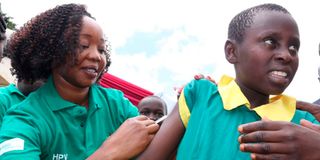Sustain uptake of HPV jab

A pupil at Ossen Primary School in Baringo North receives the HPV vaccine in 2019. A trial conducted in Kenya has shown that a new single dose vaccine is highly effective against the virus that causes cervical cancer.
According to the World Health Organization (WHO), cervical cancer is the fourth most common form of cancer afflicting women with 600,000 cases, resulting in 342,000 deaths, in 2020.
About 90 percent of these cases and deaths were reported in low- and middle-income countries. In East Africa, as per the National Cancer Control Programme, Kenya suffers the highest burden of cancer-related mortalities, at 3,200 annually. Cervical cancer is a sexually transmitted disease caused by Human papillomavirus (HPV).
While there are many types of high-risk HPVs, 16 and 18 are responsible for cervical cancer. But vaccines are effective against HPV. And, as with other vaccine-controlled viral infections, HPV vaccines are most effective before exposure to the virus. Therefore, WHO recommends the two-dose regimen of vaccines to girls at age 9-14, when most have not become sexually active, thus no exposure to the virus.
Following a successful pilot study in Makueni County, Kenya introduced the HPV vaccine in 2019 targeting 3.2 million girls aged 10-14 by June 2023. There was a steady uptake in its first year. But with the advent of Covid-19, there was a lull attributed to, among other factors, disruption of health services.
Some 70 per cent of girls have received one dose. Lack of awareness among parents, who should consent on behalf of their children, who are minors, is one of the hindrances that need to be addressed.
Kenya, like other countries, is committed to fulfill WHO’s ambitious strategy of eliminating cervical cancer by 2030 by ensuring 90 per cent of girls are fully vaccinated against HPV. While boys do not suffer cervical cancer (as they, obviously, do not have cervix), they can harbour the virus.
Therefore, vaccinating boys before their sexual debut is part of the long-term strategy to not only protect girls but also themselves against other HPV-related complications, such as genital warts.
Let’s ensure a steady supply of vaccines and other necessary resources and interventions to build HPV vaccine trust among parents of the target group.
- Dr Kerima is a biochemist. [email protected]. @KerimaZablon




